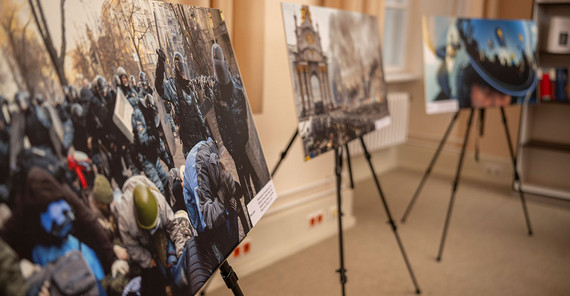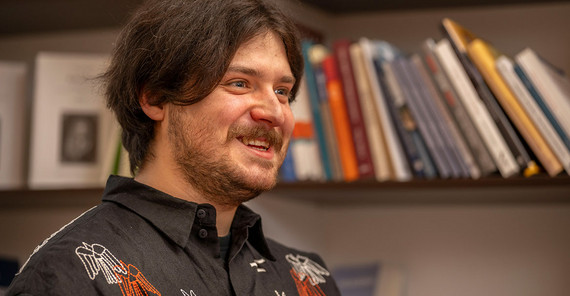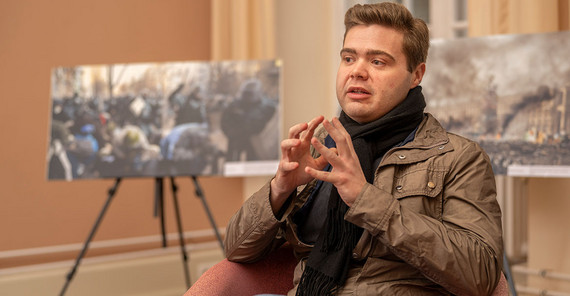Together with Yevhenii Surniaiev, Danylo Poliluev-Schmidt is conducting the seminar "The Armed Truth – Images of the Ukrainian Media" as part of StudiumPlus. "Our target group is non-Ukrainian students who want to find out more about the country," says the instructor. "They learn about the history of Ukraine from the perspective of the media." The participants also gain practical experience and develop exhibitions and events. They exchange ideas with foundations as well as journalists from Ukraine, Poland, and Germany and learn how they report from the country, usually under dangerous conditions.
Promoting media literacy
"Our seminar explores people's struggle for freedom of the press and democracy over the past decades, from the perspective of photographers," says the instructor. From the "Revolution on Granite" in 1990, when students in particular took to the streets for the country's independence from the Soviet Union, to the "Orange Revolution" after the 2004 presidential elections, which were eventually repeated due to suspicions of electoral fraud, to the "Revolution of Dignity", which began on November 21, 2013 and ended after 93 days. Last but not least, it is about recent events, the annexation of Crimea and Russia's war in eastern Ukraine. The aim is also to promote students' media literacy. "One of the main topics is fake news. The students learn to recognize distorted information, sometimes even in German or British media," says Poliluev-Schmidt.
This is the second time the seminar has been held. In the 2022/23 winter semester, participants developed an exhibition with pictures from the period from 1990 to 2022. To this end, they worked together with the Ukrainian Association of Professional Photographers (UAPP), an umbrella organization of Ukrainian photographers. The students are currently presenting a new exhibition with 30 pictures from the Revolution of Dignity. It will not only be shown at the University of Potsdam, but also in Potsdam's Nikolaisaal and in Berlin. Danylo Poliluev-Schmidt brought three of the photographs to the interview: They show the police violence of the Ukrainian special unit Berkut against protesters on Maidan Square in Kyiv. The images were taken by photographers Alexey Furman and Vladyslav Muslienko, who will also explain how the photographs were taken at a panel discussion organized by the students at "Café Kyiv" in February 2024. The third photographer, Macs Levin, has since been killed in the war.
One of the seminar participants is Noah MacKay. "As an American, it is important for me to learn more about Ukraine and its history," says the student, who has close friends from the country. "In the US, this perspective is missing in the reporting, it's all about battles and current headlines, not about the history of the war." In the States, Noah MacKay studied German and physics at East Carolina University. He is now completing a master's degree in German studies in Potsdam. A few weeks ago, he took part in an event in Wildau on scientific links between Ukraine and Germany: "Creating this cooperation between Germany and Ukraine is important to me." He would like to use his knowledge from the seminar to impart knowledge on the history of Ukraine to other Americans in the future.
Defending democracy
"The Revolution of Dignity was exactly ten years ago," says Poliluev-Schmidt, who has lived in Germany since 2019 and is studying biochemistry and molecular biology in Potsdam. "It has been overlooked in Germany and elsewhere. And when there were reports, there was initially talk of either a coup or a riot by right-wing extremists." It was only later that the events were described as a revolution. Danylo Poliluev-Schmidt comes from Ukraine and also has Polish roots. During the Revolution of Dignity 2013/14, he studied in Lviv. "When I heard that President Viktor Yanukovych was not going to sign the agreement on Ukraine's accession, I felt like someone had stolen my future. I was born in independent Ukraine in 1996 and grew up with the idea that we would become part of the EU and NATO – just like Poland, Lithuania, Latvia, and Estonia." The student traveled to Kyiv and took to the streets with thousands of people. "When the military police department used violence against the peaceful protesters, we understood that this government would only oppress us." The majority of the protesters were students. "On some days, countless people were on the Maidan even at minus 20 degrees Celsius. We stood so close that we didn't freeze and sang the national anthem: 'We will give our bodies and souls for our freedom'." Many people were injured at the time, and more than 100 people were shot dead during a demonstration on February 20, 2014. It is still unclear who is responsible for their death. "At the time, it was about more than EU accession, it was about democracy and our freedom of opinion. These events have helped Ukraine to fight on and defend its dignity and democracy, and not just on paper," says Danylo Poliluev-Schmidt.
He will offer the seminar again in the summer of 2024. After that, he wants to complete his studies. However, he already has an idea to keep the project alive: Together with interested seminar participants, he would like to found an association for the country's media culture.
You can still visit the exhibition on the following dates:
March 14 - 28, 2024, Free Ukrainian University, Munich
Regarding the Ukrainian Association of Professional Photographers (UAPP): www.ukrainianphotographers.com/en
Regarding the “Initiative für Wissensaustausch, Empowerment und Kultur e.V.” (IWEK), the association for knowledge exchange, empowerment, and culture that supports the exhibition: http://iwekev.de
Regarding activities at the TH Wildau on German-Ukrainian scientific relations: https://www.th-wildau.de/index.php?id=39208



